Ten Days at a Silent Buddhist Retreat
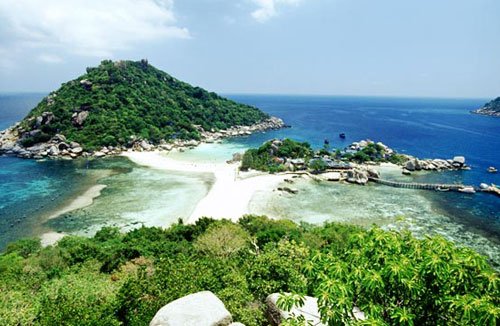
In a secluded spot in the south of Thailand, not too far from the port town of Surat Thani, is the Suan Mokkh International Dharma Hermitage Center. Founded in 1989, Suan Mokkh has been home to a silent retreat, which over the last few decades has seen more than twenty-five thousand visitors who go to learn more about meditation, mindfulness and Buddhism.
While planning a trip around SE Asia earlier this year, I had seen a brief mention of the retreat in Lonely Planet. It caught my attention as I’d been meditating on and off for about two years, having been taught at the excellent Zen Dojo in Cork City. Unfortunately, I had allowed it to lapse from a daily discipline to a casual weekly hobby. A stay at Suan Mokkh, I thought, would be ideal to rekindle a sense of duty with the practice.
The retreat runs from the first to the tenth of each month, and there is no online registration — you have to show up at the monastery on the final day of the preceding month. So on the thirtieth of March I made the bus journey to Surat Thani, and from there a minibus towards Chaiya dropped me off at the main monastery. Registration for the retreat was early the following morning, and participants were invited to stay overnight.
That evening, in a tiny eatery just outside the grounds, I was joined by some folks also doing the retreat: Ben, an affable young Aussie who had quit business school to travel and decide on a new career path, and Antoine, a grizzled Frenchman, well versed in esoterica. He had done more research than most, mentioning that Suan Mokkh was one of the most intensive retreats he’d encountered and that he didn’t expect it to be easy. The observation was intimidating.
In the morning, we were ferried by car in groups to the retreat itself, located about a kilometer away from the monastery. The grounds were stunning: a series of small temples set in a lush green area, dotted with coconut trees and small lakes, and central to all of this, a beautiful outdoor meditation hall.
The carloads of participants kept coming, and soon there were at least one hundred people, maybe more. Upon arrival, the first point of order was to read and sign a document that outlined what was required of us as participants. It was immediately clear that this was not R&R; while living in the grounds of a monastery we were fully expected to live the monastic life. To do otherwise would be to offend the Thai people who kindly donated to the upkeep of the monastery. The provisos of the stay included:
– No speaking whatsoever, except in medical emergencies
– Rising every day at 4 am.
– Two meals a day only, both before noon, and a cup of tea in the evening
– No reading or writing
– Absolutely no phones, camera or computers (these were kept in storage by the monastery)
– No sexual activity
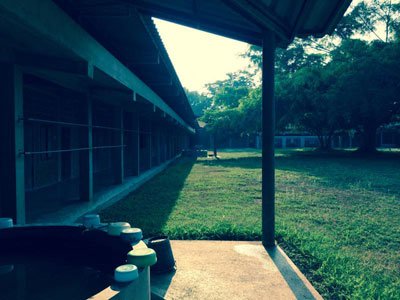
We were shown to the men’s dorms, a rectangular group of sleeping quarters set around a grassy area. The rooms themselves were essentially cells—the bed was concrete with a slim bamboo mat for a mattress, the pillow a curved block of wood. The biggest luxury was a mosquito net. My greatest concern was that there was no air conditioning or fan—though I’d been in Thailand about five weeks and was well acclimatised, it was still the dry season and there was little respite from the heat, even at night. This was borne out on the first evening, when the lights were switched off at 9.30. The concrete walls allowed little dissipation of heat, and I was soon lying in a pool of sweat.
Sleep seemed impossible, but at some point, I drifted off. It felt as if I’d hardly closed my eyes when the 4 am monastery bell tolled. Everyone was up within minutes, and I was impressed (and motivated) by the collective discipline. We walked in silence and darkness to the main outdoor temple. Upon a layer of sand, we placed coconut sacks and cushions, and sat. We were addressed by Werner, a German monk in training, whose yawning tone of voice belied his authoritative presence. He spoke in no uncertain terms: this was going to be difficult. We were to follow the rules assiduously. We were not to expect any tangible results from the meditation, and yet expected to commit to it absolutely. This matter-of-fact delivery is typical of Buddhism and Zen teachings; promises of deliverance or salvation are notably absent, and replaced, for the most part, with a candid vernacular of pragmatism.
And so, the first meditation began. We sat wordlessly for forty-five minutes in, as Werner had recommended, ‘the position least uncomfortable for you’, while the wildlife in the near distance provided a tropical soundtrack. This first sitting was, for me, a mix of enthusiasm and fear—I was thrilled that I’d made it here, that I was actually doing it, and that this was probably one of the most beautiful, serene places in the world to practice meditation. I was also scared that ten days of this was far too much to have taken on. And there was at least a good statistical chance that it was, considering the retreat’s typical dropout rate is one in four.
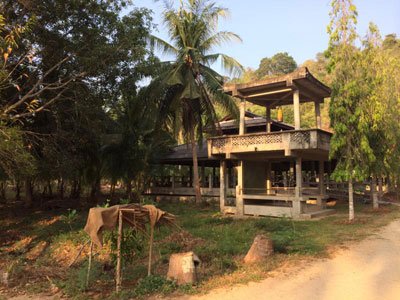
After morning meditation, the men and women split up for a yoga class. These lessons were a great way to begin the day, exercising silently as the sun rose. However, it was also when the effects of the new sleep regime were most apparent, and whenever we lay in rest postures for a minute or two, the scattered sounds of snores were inevitably heard.
Another forty-five minute meditation followed, after which we filed into the dining hall for the first of the day’s two meals. Breakfast was a rice porridge with various beans and sweetcorn. It was tasty enough, though when it became apparent that there was to be no variation in this meal throughout the retreat, it became less appetising. Thankfully, this was offset by the lunch, which varied each day and was delicious. Plenty of beans, vegetables and noodles (no meat), and it was quite acceptable to go up for seconds. Most people took advantage of this, it being the last meal of the day. This was daunting at first, knowing that with the last scoop you wouldn’t eat again until the following morning. But again, it was surprising how quickly one’s body adapted to having no choice in the matter.
The rest of the day consisted of lots more sitting and walking meditation (a total of six sessions every day), doing your assigned chores (mine was sweeping the dorm entrance and hallway), and a chanting lesson, wherein we read and sang phonetic translations of Pali verse. There was also a daily Dhamma talk: a lecture on meditation and mindfulness from one of the resident monks.
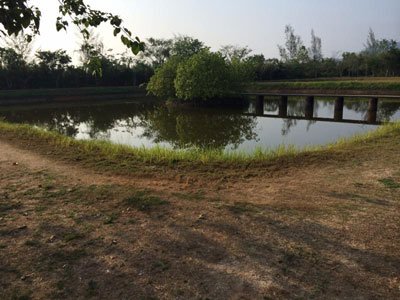
At the end of each day, and between the final two sittings, we had a walking meditation around two large nearby ponds. Each group (guys and girls) had a leader who strolled ahead. The long lines of people slinked silently around the water, illuminated at each corner by candlelight. It was almost surreally beautiful. One night, the stars radiated out from a full moon directly overhead while a distant electrical storm pulsed light through boiling clouds. All the while, fireflies drifted lazily past, creating a lightshow so stunning that it was difficult to not be overwhelmed. One final sitting followed, then the languid walk back to the dorm, and sleep.
And that was our routine, day in, day out, for ten days, with not a single word spoken among the participants.
The first few days were especially difficult, both because of the shock of the new routine and the thought of the length of time to which we had committed. But after three days or so, I began to feel a sense of ease and familiarity. The dormitory area felt like a tiny, silent village with folks going about their chores, sitting in the sunshine, washing their clothes by hand. The mating calls of geckos, so irritating at the outset of the retreat, began to feel like a welcome break to the stillness. Pairs of tropical birds sang in repeated asynchronous bursts, eventually overlapping and producing weird and wonderful Reichian phasing effects. And the night sky, unhazed by artificial light, was a constant wonder.
Mosquitos were everywhere, and yet far from the biggest zoological concern: we were warned to keep a mindful eye out for large spiders, centipedes, millipedes and scorpions. None of the species in Suan Mokkh were deadly but we were told that the pain, if bitten or stung, could be excruciating. Initially, I thought these portents were prudent at worst. I was wrong. Within the first two days, I saw a German guy usher a huge spider from his cell, and I swiftly made way when a millipede scuttled at top speed out of mine. I also learned after the retreat that an American guy had been stung by a scorpion and spent a full day incapacitated in the infirmary.
Killing any of the beasts was not an option: we were living as monks do, and monks follow the Buddhist precepts, the first of which is ‘Take No Breath Away’ (which, I kept thinking, would certainly preclude Maverick from ‘Top Gun’ from enrolling). This made for an interesting relationship with the mosquitos: they would land on you in their uniquely Brownian, ‘Sure I might wander in’ manner, but one’s natural reaction — to whack them — had to be repressed. You brushed them away and hope they didn’t return. It demanded mental fortitude, but in taking the retreat seriously, you had little choice in the matter.
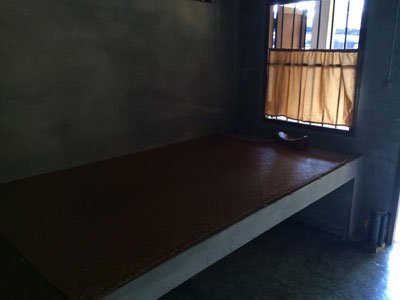
Indeed, that idea of being ‘without choice’ became one of the best mental supports as the retreat continued into days four and five. There was no possibility of sneaking in another meal, avoiding a meditation, etc. Since you couldn’t stay in bed when the bell rang at 4 am — nor would you want to, considering how uncomfortable it was — you simply didn’t give any thought to it, and you just got up. The context of it being a typically ungodly time to rise became irrelevant; it was just what was done. And you may as well put effort into meditating, otherwise you were facing ten long days of sitting uncomfortably.
The only choice that might have seemed tempting was that of leaving the retreat entirely, and a lot of folks did just that. If you decided to leave, there was a strict protocol: after giving the staff a day’s notice, you were ushered from the retreat with as little disturbance as possible to the rest of the group. It was only after a few days I realised that some of the faces I’d come to recognise were no longer around. One pair of English lads who looked as if they’d come straight from the Full Moon Party were visibly perturbed at the rigorous schedule expected of them, and exited quickly.
I also realised that the enforced silence was a tremendous tool for keeping up group morale. At various times one might have felt intensely discouraged, but the assumption, especially when furtively glancing around the meditation hall, was that everyone else was practically afloat with Zen insight, and that you needed to up your game. Of course, the truth was that almost everyone there was going through the same difficulties. But by de-verbalizing interactions to gentle smiles and nods, the corps d’esprit was insulated from commiseration.
Breaks in the silence were few and far between, and one of the most welcome times of each day was the Dhamma Talk. Ajahn Po, one of the oldest monks at the monastery, gave many of these. They were impassioned, though the monk’s limited command of English rendered some topics impenetrable, to my ears at least. However, a British monk also gave some of the talks, and these were wonderful. He spoke with a no-nonsense English sensibility and covered a wide range of subjects: the life of the Buddha; the idea that human suffering can be traced back to infanthood; the use of psychedelic drugs to induce meditative states.
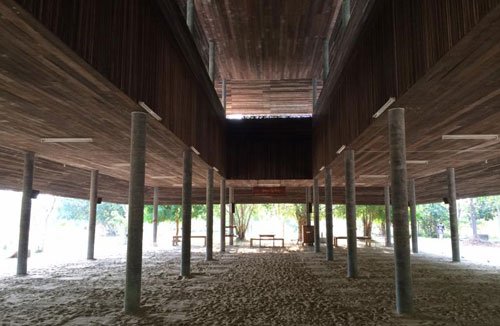
These talks were excellent, and oases of stimulation in days of silence. I found myself looking forward to them with an anticipation that bordered on fervour. In fact, around days five and six, I noticed that my mind was producing strange ways of attempting to entertain itself. At one point, I got a fit of the giggles that I couldn’t shake for an hour or so; at another I had the theme song from ‘The Fresh Prince Of Bel-Air’ stuck in my head for an entire evening.
I found myself poring over random memories from my school years; silly adolescent slights and embarrassments that I hadn’t considered in years. Eventually, I decided that this was my ego’s fitful way of reacting to the silence, of attempting to entertain and draw attention to itself when faced with extended relegation. As was said in one of the Dhamma talks, ‘anger, frustration and self-pity are extremely powerful emotions because they provide such strong self-definition.’ In the silence of a Thai monastery, my ego was frantically seeking lucidity in grievances and theme songs from decades ago and thousands of miles away.
The retreat was not without moments of levity. Once, while silently walking out of the meditation hall, a girl strolling ahead of the group inadvertently let rip a loud fart, turned around in a panic and said ‘Sorry!’, then clapped her hands to her mouth in realisation of her vocal offense. There were also two young French guys who, I found out from the group afterwards, were seen on at least one occasion darting into the retreat’s wooded boundaries for a secret tryst.
The final few days of the retreat saw a change in the timetable, and the days became even more intense. Day nine was meditation throughout, with no chanting or Dhamma Talks. One of the sessions was a marathon three and a half hours of meditation, straight through. We were also reduced to just one meal in the day, a pre-noon lunch. Again, this all seemed intimidating at first, but the swiftness with which the mind accepted and adapted to the timetable was ever-surprising.
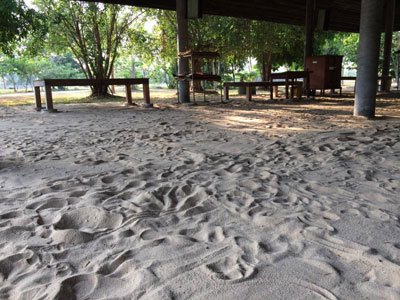
Day ten rolled around, and with it, the inevitable excitement of nearing the retreat’s conclusion. It was hard not to think about getting out into the world again, and the meditations seemed especially difficult. We also did an hour of ‘Mindfulness at Work’, which was basically sweeping the outdoor paths of the retreat in large groups. Though it was outdoor work in the midday Thai sun, it felt refreshing and enjoyable. In the evening, we gathered in the meditation hall and were addressed one last time by Werner, who congratulated us on seeing out the ten days. People were then invited to approach the podium and speak briefly about their experience. Many did so (myself included), and the stories of how people had come to find this little corner of the world were varied and fascinating. After some time, the bell rang and we strolled off to the dorms in silence. And with that, day ten was over.
In the morning, we retrieved our belongings from the desk, and for the first time in a week and a half, spoke to each other in person. For about an hour people walked around introducing themselves to the folks with whom they’d been living. Enthusiastic, rushed conversations were had. Email addresses and Facebook details were exchanged en masse. Slowly, the crowd dissipated as folks made their way to the bus stop by the main monastery. After having had a deeply intense collective experience, most of these people would never see each other again.
I waited for a Songthaew bus that took me to Surat Thani. I booked into a nice hotel, slept in a soft bed, ordered coffee, ate street food and drank beer.
In the weeks that followed in my travels, I noticed definite benefits from the retreat—my behaviour became less slavish to the ego, less likely to succumb to whims and vagaries. If, for example, I was on a bus journey and realised that I was hungry, with hours of travelling to go, I wouldn’t allow that feeling of discomfort to dominate my thoughts. If I couldn’t do anything about it, then I may as well not do anything about it, including ruminating or worrying. Of course, over the next few months and with the fraught nature of travel in that part of the world, the positive effects of the retreat diminished. But in the long term, it taught me something valuable.
Though I’d begun it with the intention of bettering my ability to meditate and be mindful, I found the retreat more a test of self-discipline. Ten days of silence forces you to explore the nature of impatience itself, and why it should be difficult at all to just sit and be alone.
It is the antithesis of flicking through a hundred TV channels or browsing the internet with fifteen tabs open. It’s a reminder that the self can only ever be as frustrated as the reveries it’s allowed to consider, and that with restraint and a self-imposed lack of choice, it can be astonishingly focused. Pursued over years to a logical end, that can potentially mean a total freeing from inner suffering. Pursued for ten days, it can at least be an invaluable reminder of one’s own potential.
Thanks to Morna O’ Connor for editorial goodness.

